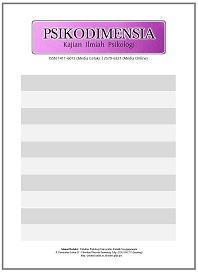Pelatihan Empati dan Perilaku Prososial pada Anak Usia Sekolah Dasar
Abstract
Abstrak: Perilaku prososial mempunyai dampak positif bagi anak-anak. Namun, masih banyak anak usia sekolah belum mengembangkan perilaku prososial. Kajian literatur menunjukkan bahwa perilaku prososial dapat ditingkatkan melalui pelatihan empati. Tujuan dari penelitian ini untuk mengetahui efektivitas pelatihan empati dalam meningkatkan perilaku prososial anak usia sekolah. Riset menggunakan pendekatan eksperimen kuasi atau semu, dengan desain pre-post test. Subjek penelitian terdiri dari 20 anak kelas 5 dari salah satu Sekolah Dasar di Kota Semarang, baik laki-laki maupun perempuan dengan rentang usia antara 10 sampai 12 tahun, dengan taraf intelektual minimal rata-rata. Pelatihan empati dilakukan sebanyak 4 sesi, setiap sesi berlangsung sekitar 2 jam. Sebelum dilakukan pelatihan, orang tua diminta untuk mengisi lembar informed consent yang menyatakan bahwa orang tua menyetujui dan tidak berkeberatan anak-anak mereka dilibatkan dalam penelitian dengan diberikan Pelatihan Empati. Alat ukur yang digunakan adalah tes Coloured Progressive Matrices (CPM), Skala Perilaku Prososial, dan Skala Empati. Hasil penelitian menunjukkan terdapat perbedaan yang sangat signifikan pada perilaku prososial sebelum dan setelah diberikan pelatihan empati (t = 4,359; p = 0,000). Pelatihan empati efektif meningkatkan perilaku prososial anak usia sekolah.
Kata kunci: Anak usia sekolah, pelatihan empati, perilaku prososial
Abstract: Prosocial behavior had brought positive impact for children. However, many school-aged children have not developed prosocial behavior. Literature review showed that prosocial behavior could be improved by empathy training. The purpose of this research was to find the effectiveness of empathy training in improving the prosocial behavior of school-aged children in Semarang. The research used quasi-experiment with pre and post test design. The subjects were 20 fifth-grade elementary school children, male and female. The age of the students ranged from 10 years to 12 years old and their level of intellectual ability were at least at average level. Training was conducted for 4 sessions, with 2 hours duration for each session. Prior to the implementation of the study, parents filled out an informed concent stated that they agreed their children participated in empathy training. Instruments used were Coloured Progressive Matrices (CPM), Prosocial Scale, and Empathy Scale. The results showed there was a very significant difference between a child's prosocial behavior score before and after attending empathy training (t = 4,359; p = 0,000). Empathy training effective to improve the prosocial behavior of primary school-aged children.
Keywords: Children, empathy training, prosocial behaviorKeywords
Full Text:
PDFReferences
Reiss, H. (2017). The science of empathy. Journal of Patient Experience, 4(2), 74-77. Doi:10-1177/ 2374373517699267.
Schonert-Reichl, KA., Smith, V., Zaidman-Zait, A., & Hertzman, C. (2012). Promoting children’s prosocisal behavior in school: impact of the “roots of empathy” program on the social and emotional competence of school-age children. School Mental Health. Springer link, 4(1), 1-21. Diakses dari https://link,springer.com/ article/10.1007/s12310-011-9064-?
Spinrad, T.L, & VanSchyndel S. (2015). Socio-Cognitive Correlates of Prosocial Behavior in Young Children. Dalam Encyclopedia of Early Childhood Development: Prosocial Behavior. A. Knafo-Noam (ed). Hal 21-26. Diakses dari http://www.child-encyclopedia.com/sites/default/ files/dossiers-complets/en/prosocial-behaviour.pdf
Tappangan, A.F.M.P. (2014). Pengaruh Pelatihan Empati Terhadap ABK pada Kecenderungan Perilaku Prososial Siswa Reguler Di Sekolah Inklusi Manguni Surabaya. Abstrak Skripsi. (tidak diterbitkan). Fakultas Psikologi Universitas Katolik Widya Mandala Surabaya
Van Berkhout, E.T & Malouff, J.M. (2015). The efficacy of empathy training: a meta analysis of randomized controlled trial. Journal of Counseling Psychology, 63(1), 32-41. Diakses dari http://dx.doi.org/10.1037/cou0000093
Wentzel, K. (2015). Prosocial Behaviour and Schooling. Dalam Encyclopedia of Early Childhood Development: Prosocial Behavior. A. Knafo-Noam (ed), 57-61. Diakses dari http://www.child-encyclopedia.com/sites/default/ files/dossiers-complets/en/prosocial-behaviour.pdf
Zahn-Waxler, C. & Schoen, A. (2015). Empathy, Prosocial Behaviour and Adjustment: Clinical Aspects of Surfeits and Deficits in Concern for Others. Dalam Encyclopedia of Early Childhood Development: Prosocial Behavior. Ariel Knafo-Noam (ed), 42-51. Diakse dari http://www.child-encyclopedia.com/sites/default/files/dossiers-complets/ en/prosocial- behaviour.pdf
DOI: https://doi.org/10.24167/psidim.v20i1.2879
Print ISSN : 1411-6073 | online ISSN : 2579-6321 View My Stats

This work is licensed under a Creative Commons Attribution 4.0 International License.




















